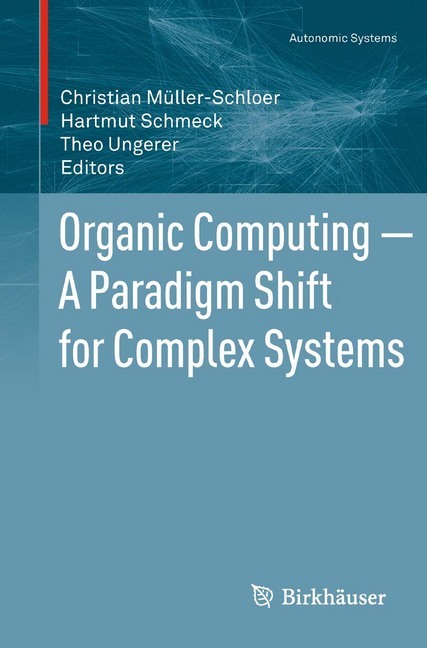Müller-Schloer, Christian (Hrsg.)
Schmeck, Hartmut (Hrsg.)
Ungerer, Theo (Hrsg.)
Organic Computing - A Paradigm Shift for Complex Systems
A Paradigm Shift for Complex Systems

Beschreibung
Organic Computing has emerged as a challenging vision for future information processing systems. Organic Computing is based on the insight that we will soon be surrounded by large collections of autonomous systems, which are equipped with sensors and actuators, aware of their environment, communicating freely, and organising themselves in order to perform the actions and services that are required by the users.
The presence of networks of intelligent systems in our environment opens fascinating application areas but, at the same time, bears the problem of their controllability. Hence, we have to construct such systems which we increasingly depend on as robust, safe, flexible, and trustworthy as possible. In particular, a strong orientation towards human needs as opposed to a pure implementation of the technologically possible seems absolutely central. In order to achieve these goals, our technical systems will have to act more independently, flexibly, and autonomously, i.e. they will have to exhibit life-like properties. We call those systems "organic". Hence, an "Organic Computing System" is a technical system, which adapts dynamically to the current conditions of its environment. It will be self-organising, self-configuring, self-optimising, self-healing, self-protecting, self-explaining, and context-aware, while offering complementary interfaces for higher-level directives with respect to the desired behaviour in order to cope with unexpected or undesired events.
First steps towards adaptive and self-organising computer systems are already being undertaken. Adaptivity, reconfigurability, emergence of new properties, and self-organisation are topics in a variety of research projects. The special priority research program (SPP) of the German Research Foundation (DFG) addresses fundamental challenges in the design of Organic Computing systems; its objective is a deeper understanding of emergent global behaviour in self-organising systems and the design of specific concepts and tools to support the construction of Organic Computing systems for technical applications.
This book documents the results of the 6-year research programme. But it is much more than a collection of project reports. In 6 chapters it discusses the theoretical foundations of Organic Computing, basic methods and tools, learning techniques used in Organic Computing, architectural patterns and many applications. The final outlook shows that Organic Computing ideas have spawned in the meantime a variety of new projects beyond the original research programme.
The presence of networks of intelligent systems in our environment opens fascinating application areas but, at the same time, bears the problem of their controllability. Hence, we have to construct such systems which we increasingly depend on as robust, safe, flexible, and trustworthy as possible. In particular, a strong orientation towards human needs as opposed to a pure implementation of the technologically possible seems absolutely central. In order to achieve these goals, our technical systems will have to act more independently, flexibly, and autonomously, i.e. they will have to exhibit life-like properties. We call those systems "organic". Hence, an "Organic Computing System" is a technical system, which adapts dynamically to the current conditions of its environment. It will be self-organising, self-configuring, self-optimising, self-healing, self-protecting, self-explaining, and context-aware, while offering complementary interfaces for higher-level directives with respect to the desired behaviour in order to cope with unexpected or undesired events.
First steps towards adaptive and self-organising computer systems are already being undertaken. Adaptivity, reconfigurability, emergence of new properties, and self-organisation are topics in a variety of research projects. The special priority research program (SPP) of the German Research Foundation (DFG) addresses fundamental challenges in the design of Organic Computing systems; its objective is a deeper understanding of emergent global behaviour in self-organising systems and the design of specific concepts and tools to support the construction of Organic Computing systems for technical applications.
This book documents the results of the 6-year research programme. But it is much more than a collection of project reports. In 6 chapters it discusses the theoretical foundations of Organic Computing, basic methods and tools, learning techniques used in Organic Computing, architectural patterns and many applications. The final outlook shows that Organic Computing ideas have spawned in the meantime a variety of new projects beyond the original research programme.
Produktdetails
| ISBN/GTIN | 978-3-0348-0130-0 |
|---|---|
| Seitenzahl | 627 S. |
| Kopierschutz | mit Wasserzeichen |
| Dateigröße | 22562 Kbytes |

